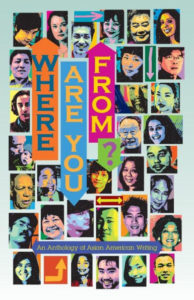 When our Asian American activist group put together the anthology, Where Are You From?, we decided that the question we are often asked would make a good title for our book because it expressed many of our experiences as AAs in America. The question can be interpreted in many ways, depending on who is asking and how they are asking the question. It can be interested. Wary. Looking for reasons to accept or reject. Befriend or report to the authorities. The question might make us feel like The Other, as not belonging even though many of us are American citizens. Sometimes we choose to believe that the question is asked as a chance to explain ourselves. Sometimes we walk away from the question feeling resentful that we are obligated to prove that, even though we aren’t White, we still have a right to be in the United States, too.
When our Asian American activist group put together the anthology, Where Are You From?, we decided that the question we are often asked would make a good title for our book because it expressed many of our experiences as AAs in America. The question can be interpreted in many ways, depending on who is asking and how they are asking the question. It can be interested. Wary. Looking for reasons to accept or reject. Befriend or report to the authorities. The question might make us feel like The Other, as not belonging even though many of us are American citizens. Sometimes we choose to believe that the question is asked as a chance to explain ourselves. Sometimes we walk away from the question feeling resentful that we are obligated to prove that, even though we aren’t White, we still have a right to be in the United States, too.
Recently, we are having to confront a less opaque “threat” when we hear the directive, “Go back to where you came from!” The person saying this has already pronounced judgment on the Other. They have closed their minds to hearing our stories. Today, it is even more important that we share our stories* so people will see us as fellow human beings with the same feelings, wants, and needs. I think most of us feel terrible when people say insensitive things to and about us that imply that we are inferior to them and don’t “belong.” We all want to make good lives for ourselves and our families. We want to belong and be accepted for who we are and what we bring to those around us. We want to live in a peaceful world which will allow us to make these “good lives.” I have a hard time understanding those who tell others to “Go back to where you came from!” because, as a citizen in a nation built by immigrants, doesn’t this mean we all (including the person making that demand) have to leave the United States? Doesn’t this mean only Native Americans have a “right” to be here, if we base this “right” on origin?
In some ways, “Where are you from” and “Go back to where you came from” ask the same “origin” questions. Is Origin:
- Where our Original ancestors were born? What if they mostly lived somewhere other than where they were originally born?
- Where we, ourselves, were born? What if we mostly lived somewhere other than where we were originally born?
- Where we are now citizens?
- Where we live now even if we are not yet citizens?
 When we move to another place, it’s never without a lot of anxiety and difficulties… but I have a feeling that most people move because they want better lives and are willing to risk everything. That is why my grandparents moved to Hawaii from Japan. That is why my husband and I moved to Oregon from Hawaii. Is that such a bad motivation? Isn’t that how progress is made? By people wanting better lives for themselves and their children?
When we move to another place, it’s never without a lot of anxiety and difficulties… but I have a feeling that most people move because they want better lives and are willing to risk everything. That is why my grandparents moved to Hawaii from Japan. That is why my husband and I moved to Oregon from Hawaii. Is that such a bad motivation? Isn’t that how progress is made? By people wanting better lives for themselves and their children?
The immigration issue is very complex. But it seems to me that the screening at our borders could be simplified if we ask different questions of those wanting to be admitted to our country. Questions such as:
- Why do you want to live in the United States?
- Do you know anyone in the U.S. who can help you until you are on your feet?
- What kind of work can you do if admitted to the USA?
- Will you promise to be a good person while in the USA (and if you do something bad like rape, kill, torture or maim another human being, then you can be deported … and to be fair, maybe any American who does any of these things can be deported to the country their ancestors came from if it’s decided that ancestral origins define where we came from)?
- And are you a human being (as opposed to an alien from another planet – although, perhaps one day, we may need to be open to them as well if they will help us with the multitude of problems we are creating for ourselves, our country, and our planet … )?
 Valerie Katagiri is co-editor of Where Are You From: An Anthology of Asian American Writing and coordinates the web-blogs for the book’s related AsianAmericanWriting.com website. She would love to hear your stories.
Valerie Katagiri is co-editor of Where Are You From: An Anthology of Asian American Writing and coordinates the web-blogs for the book’s related AsianAmericanWriting.com website. She would love to hear your stories.
* Email Valerie at info@asianamericanwriting.com if you have personal stories and essays (and videos, art, poems, etc) that you want to share with our readers.
